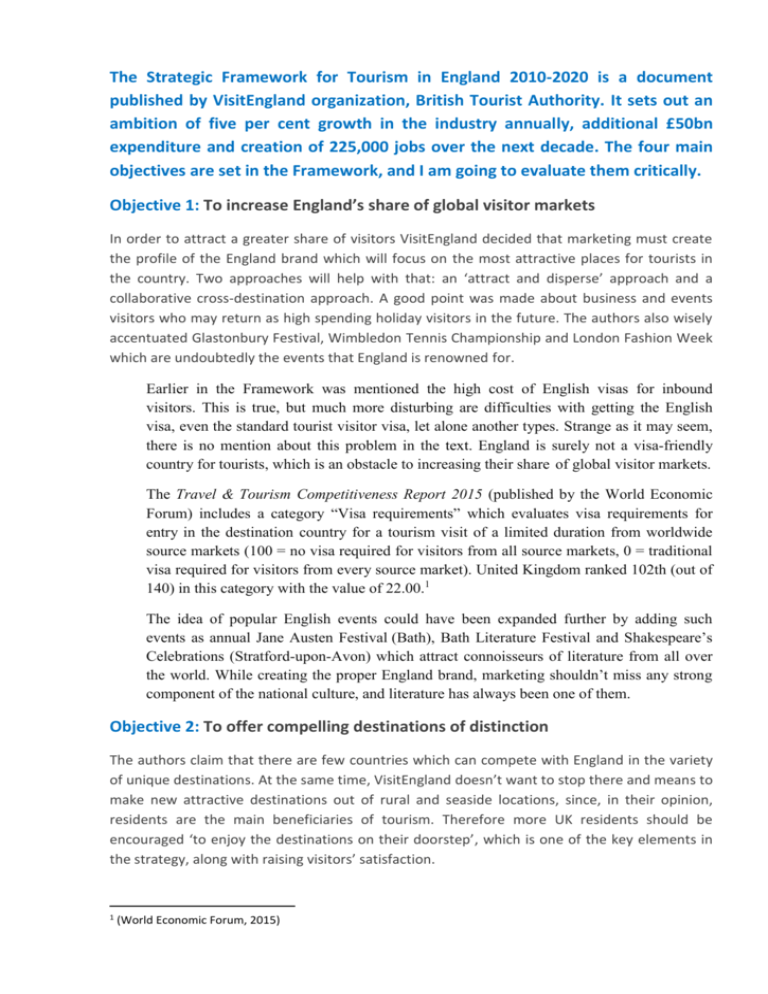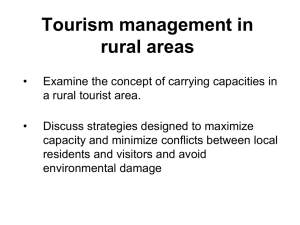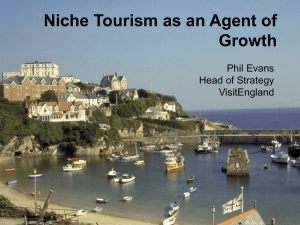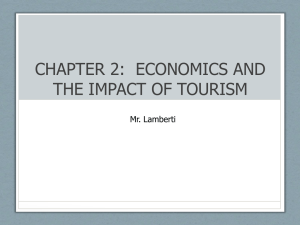Objective 1: To increase England`s share of global visitor markets
advertisement

The Strategic Framework for Tourism in England 2010-2020 is a document published by VisitEngland organization, British Tourist Authority. It sets out an ambition of five per cent growth in the industry annually, additional £50bn expenditure and creation of 225,000 jobs over the next decade. The four main objectives are set in the Framework, and I am going to evaluate them critically. Objective 1: To increase England’s share of global visitor markets In order to attract a greater share of visitors VisitEngland decided that marketing must create the profile of the England brand which will focus on the most attractive places for tourists in the country. Two approaches will help with that: an ‘attract and disperse’ approach and a collaborative cross-destination approach. A good point was made about business and events visitors who may return as high spending holiday visitors in the future. The authors also wisely accentuated Glastonbury Festival, Wimbledon Tennis Championship and London Fashion Week which are undoubtedly the events that England is renowned for. Earlier in the Framework was mentioned the high cost of English visas for inbound visitors. This is true, but much more disturbing are difficulties with getting the English visa, even the standard tourist visitor visa, let alone another types. Strange as it may seem, there is no mention about this problem in the text. England is surely not a visa-friendly country for tourists, which is an obstacle to increasing their share of global visitor markets. The Travel & Tourism Competitiveness Report 2015 (published by the World Economic Forum) includes a category “Visa requirements” which evaluates visa requirements for entry in the destination country for a tourism visit of a limited duration from worldwide source markets (100 = no visa required for visitors from all source markets, 0 = traditional visa required for visitors from every source market). United Kingdom ranked 102th (out of 140) in this category with the value of 22.00.1 The idea of popular English events could have been expanded further by adding such events as annual Jane Austen Festival (Bath), Bath Literature Festival and Shakespeare’s Celebrations (Stratford-upon-Avon) which attract connoisseurs of literature from all over the world. While creating the proper England brand, marketing shouldn’t miss any strong component of the national culture, and literature has always been one of them. Objective 2: To offer compelling destinations of distinction The authors claim that there are few countries which can compete with England in the variety of unique destinations. At the same time, VisitEngland doesn’t want to stop there and means to make new attractive destinations out of rural and seaside locations, since, in their opinion, residents are the main beneficiaries of tourism. Therefore more UK residents should be encouraged ‘to enjoy the destinations on their doorstep’, which is one of the key elements in the strategy, along with raising visitors’ satisfaction. 1 (World Economic Forum, 2015) In my opinion, the attractiveness of England is slightly exaggerated, although I perfectly understand why the authors need to place an emphasis upon it. Undeniably, England does have some unique destinations to offer (e.g. Stonehenge and Avebury, The Lake District, Land’s End in Cornwall, Roman Baths, the White Cliffs of Dover) but so do the other countries. The fact is, there can’t be a lot of truly unique, the only one of its kind, places in one country. That is why they are unique. So why would people prefer some small town, which VisitEngland wants to ‘regenerate and enhance’, to a more popular destination outside the UK? In the Framework there is no answer to this question. These new destinations seem to possibly become popular only on the national level, amongst residents who have already visited every famous place in the country. England already has its destinations of distinction, and I think the official tourist board should focus more attention on them. Objective 3: To champion a successful, thriving industry A perception of tourism as an employer in England is still poor and there are significant skills shortages in some key areas such as chefs, customer service staff and hospitality management. VisitEngland considers that, to be a successful industry, tourism needs to create new employment opportunities for citizens, besides a skilled workforce is essential. Along with positive economic benefits, tourism brings the potential for negative social and environmental impacts. That is why a ‘wise growth’ approach was introduced. I think it is important that VisitEngland pays much attention to local economies and communities’ needs. They acknowledge that tourism is successful only when it meets needs of both residents and tourists. Still, welcoming foreign visitors is something they need to improve further, since England ranked 55th in the category “Attitude of population toward foreign visitors” of the Travel & Tourism Competitiveness Report 2013 published by the World Economic Forum (in the latest Report this indicator was dropped).2 Objective 4: To facilitate greater engagement between the visitor and the experience VisitEngland believes that information provision, a warm welcome, great service and transport provision are the key elements which need to be improved and modernized to attain this objective. The authors also took into consideration that people with accessibility needs represent a growth sector of the market and access for them must be improved. In other words, this objective aims at making every visitor’s stay in England comfortable and easy, and people with disabilities are taken into account. VisitEngland’s research showed that over £2 billion (more than €2.4 billion) are spent each year by people with disabilities travelling in and to England and those travelling with them. The organization has set up the three pillars of accessible tourism: information and promotion, customer service and the physical facilities, and is trying to perfect each element. They also produce routes for people with access needs and prepare guidance for tourism businesses on their 2 (World Economic Forum, 2013) legal obligation to welcome assistance dogs. It seems that VisitEngland succeeded in the subject of access to tourism a lot, which corresponds to social sustainability. 3 References World Economic Forum (2013). http://www3.weforum.org The Travel & Tourism Competitiveness Report 2013, 455: http://www3.weforum.org/docs/TTCR/2013/TTCR_DataTables12_2013.pdf World Economic Forum (2015). http://www3.weforum.org The Travel & Toursim Competitiveness Report 2015, 430: http://www3.weforum.org/docs/TT15/WEF_Global_Travel&Tourism_Report_2015.pdf Graham I. (2013, December). http://ec.europa.eu Accessible Tourism in Europe. Conference on the occasion of the European Day of Persons with Disabilities and European Tourism Day. Report: http://ec.europa.eu/justice/discrimination/files/edpd_etd_2013_conference_report_en.pdf 3 (Conference on the occasion of the European Day of Persons with Disabilities and European Tourism Day, 2013)








